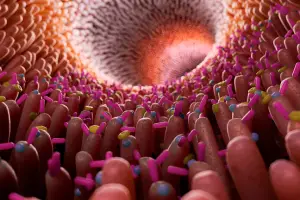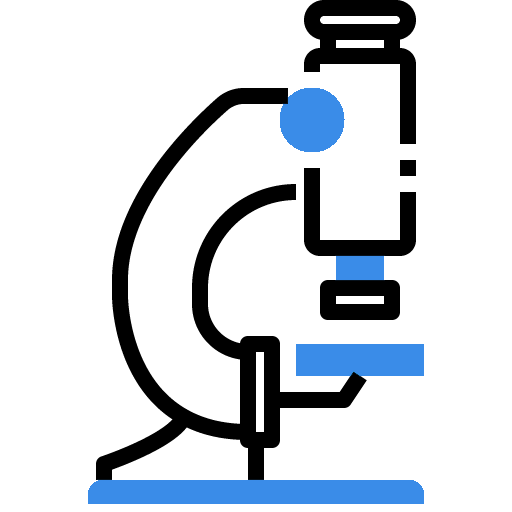Research areas
Cutting-edge Gut health research areas
Intestinal microbiota and health
At Gut-Research, we specialize in studying the complex interactions between gut microbiota and human health, with a focus on gastrointestinal diseases like inflammatory bowel disease (IBD) and colorectal cancer. Our research aims to uncover how microorganisms influence gut health, immunity, and overall well-being. Utilizing cutting-edge sequencing technologies and bioinformatics tools, we deliver comprehensive insights that drive innovative treatments and therapeutic developments.
We are deeply connected with the Microbiota Center Amsterdam (MiCA), co-founded by Wouter de Jonge alongside Max Nieuwdorp and Joost Wiersinga. MiCA is a core facility at Amsterdam UMC that offers a full suite of microbiota analysis services, including DNA isolation, gene sequencing, bioinformatics, and study design support. Our collaboration with MiCA enables us to leverage the latest technology for our research projects, ensuring fast and precise analysis.
Our capabilities
Gut-Research offers a wide range of advanced services for microbiota analysis. Our expert team and state-of-the-art facilities allow us to conduct in-depth studies on the role of microbiota in both health and disease. Key capabilities include:
- DNA isolation and sequencing: We use cutting-edge techniques to isolate and sequence microbiota DNA, delivering high-resolution data on microbial composition and function.
- Bioinformatics analysis: Our bioinformatics team employs advanced algorithms and tools to analyze sequencing data, providing deep insights into microbial communities and their interactions.
- Microbiota-host interaction studies: We investigate how microbiota interact with host tissues, particularly focusing on how these relationships influence gut health and disease progression.
- Personalized microbiota therapeutics: Based on our findings, we develop personalized therapeutic strategies aimed at modulating the microbiota to improve health outcomes, particularly in conditions like IBD and colorectal cancer.
Projects
As part of this national project, we work to understand the microbiome’s role in health and disease using advanced technologies. For more information, visit HoloMicroBiome.

In partnership with the METAHEALTH project, we explore microbiome data to better understand its influence on chronic diseases. More details can be found at METAHEALTH.
Post-operative care after colon surgery
At Gut-Research, we focus on advancing the treatment and post-operative care of colorectal cancer patients. Our research centers on improving surgical outcomes, particularly in preventing and addressing complications such as anastomotic leakage (AL), a common and serious issue following colorectal surgery. By understanding the cellular and molecular mechanisms behind wound healing, we aim to reduce the high morbidity and mortality rates associated with these complications.
We combine preclinical and clinical research to explore innovative solutions that enhance wound healing, improve post-surgery recovery, and ultimately lead to better outcomes for colorectal cancer patients.
Our capabilities
Gut-Research offers a comprehensive range of services for colorectal cancer research, focusing on post-surgical care and therapeutic development. Our cutting-edge research tools and expert team allow us to delve into the intricacies of wound healing and cancer treatment. Key capabilities include:
- Anastomotic healing research: We investigate the early processes involved in anastomotic healing (AH) to understand the factors that contribute to complications like anastomotic leakage. Our aim is to reduce the risks of these complications through improved surgical techniques and treatments.
- Preclinical and clinical models: We utilize a variety of preclinical models and clinical research methods to study surgical complications and wound healing. These models help us uncover key mechanisms involved in tissue repair and regeneration following colorectal surgery.
- Personalized post-operative care: Based on our research, we develop personalized therapeutic approaches to enhance post-surgery recovery, reduce the risks of complications, and improve the quality of life for colorectal cancer patients.
Projects
Our research into colorectal cancer treatment and post-operative care is designed to provide innovative solutions for enhancing surgical outcomes and reducing complications such as AL. By addressing both the biological and clinical challenges, we aim to improve the standard of care for colorectal cancer patients.
Funded by the EU JPI, the METARYL project explores how tryptophan, a key nutritional component, affects wound healing and the development of infections in diabetic patients. This research has direct implications for post-operative care in colorectal cancer patients as well. For more details, visit METARYL.
In collaboration with Health Holland and MRM Health, the MICROPIAL project studies how probiotics can influence wound healing and anastomosis following cancer surgery. This research aims to improve post-operative recovery by altering the microbiome’s role in healing. Learn more about our work at Health Holland and MRM Health.

Inflammatory Bowel Disease
At Gut-Research, we are at the forefront of research into Inflammatory Bowel Disease (IBD), including both Crohn’s disease and ulcerative colitis. Our work focuses on understanding the underlying mechanisms of these chronic inflammatory diseases and developing personalized therapeutic approaches. By utilizing advanced research techniques and clinical trials, we aim to provide targeted treatments that improve patient outcomes and quality of life.
Our research group has pioneered key advancements in IBD treatment, including the introduction of anti-TNF therapy for Crohn’s disease, which was a breakthrough in the management of this debilitating condition. Today, we continue to lead research into new biological therapies and personalized medicine.
Our capabilities
Gut-Research provides a wide array of services designed to support the study and treatment of IBD. Our advanced research methods and expertise allow us to deliver personalized therapeutic solutions and cutting-edge research insights. Key capabilities include:
- Pathogenesis research and personalized treatment development: We utilize a variety of models to study the mechanisms driving IBD, including single-cell sequencing, spatial transcriptomics, and in vitro and in vivo models. This enables us to explore the genetic and biological factors contributing to the disease and develop personalized treatments based on patient-specific profiles.
- Clinical trials for biological therapies: We play a critical role in coordinating phase I and II clinical trials that evaluate new biological therapies for IBD. Our research group collaborates closely with the clinical IBD group at Amsterdam UMC, ensuring that the latest therapies are tested and translated into real-world applications.
- Biomarker development for precision medicine: Through projects like Methylomic, we are working on developing biomarkers that can predict a patient’s response to treatment, allowing for a more personalized approach to IBD management. This epigenetic biomarker tool helps optimize the use of biological therapies, ensuring more effective and efficient treatments.
Projects
Our research into IBD and personalized medicine is deeply rooted in understanding the disease’s pathogenesis and translating this knowledge into practical, patient-focused treatments. By integrating biological data, clinical trials, and biomarker development, we aim to revolutionize how IBD is treated.
Funded by Horizon Europe, the Methylomic project focuses on developing an epigenetic biomarker tool to identify the best treatments for IBD patients. By leveraging DNA methylomics and machine learning technologies, the project aims to make precision medicine a reality for Crohn’s disease. Learn more at Methylomic.

This project focuses on identifying biomarker profiles that predict treatment response in perianal fistulizing Crohn’s disease. Our research aims to enable precision medicine approaches to improve care for patients with this severe form of IBD. More information can be found at AMFIBIO.

Led by Andrew Li Yim, this trial is part of our effort to understand the epigenetic aspects of IBD, aiming to uncover new therapeutic targets and refine treatment options for Crohn’s disease. For more details, visit OMICROHN Trial.

Intestinal health for the newborn
At Gut-Research, we focus on improving the intestinal health of neonates and preterm infants. Early life nutrition plays a critical role in the development of a healthy gut and the prevention of diseases later in life. Our research aims to understand the mechanisms behind neonatal gut development and how early nutrition, particularly breast milk, can protect against severe infections and long-term health risks.
Through advanced research and collaboration with leading institutions, we strive to uncover new insights that can lead to improved health outcomes for newborns, especially those at risk of complications due to premature birth or conditions like necrotizing enterocolitis (NEC).
Our capabilities
Gut-Research offers comprehensive services dedicated to improving intestinal health in newborns. Our cutting-edge research tools and clinical expertise enable us to provide detailed insights into how early nutrition impacts gut development and immune function. Key capabilities include:
- Early life nutrition studies: We focus on how breast milk protects neonates from infections such as pneumonia and sepsis, while reducing the risk of obesity and type II diabetes later in life. Our research also explores the protective factors in breast milk and how they influence gut development.
- Gut microbiota analysis in neonates: We analyze the role of microbiota in early life gut development, particularly in preterm infants. Our studies focus on how imbalances in gut bacteria can lead to severe conditions like NEC and sepsis, aiming to develop interventions that support healthy microbiota development.
- Personalized nutritional interventions: Based on our findings, we create personalized nutritional strategies to support the development of a healthy gut in neonates, particularly in those unable to breastfeed. These strategies are designed to improve gut immune homeostasis and reduce the risk of life-threatening complications.
Projects
Our research into intestinal health for the newborn is critical for understanding how early life nutrition impacts long-term health outcomes. By studying the mechanisms behind neonatal gut development, we aim to create interventions that give newborns the best possible start in life.
This innovative training program involves 10 PhD students focusing on developing biomarkers and personalized nutritional interventions for intestinal failure in neonates and preterm infants. The GROWTH project utilizes over 17,000 pre-collected fecal samples from premature infants, providing valuable insights into early intestinal development and pathogenesis. Learn more at GROWTH.

Our work is closely integrated with the KinderBuik Centrum, focusing on pediatric gastroenterology, and the EMMA Center for Personalized Medicine, where we study personalized interventions to improve intestinal health in newborns. More information can be found at KinderBuik Centrum and EMMA Center.

Ongoing projects
Projects by gut-research
We are actively involved in a diverse range of projects that push the boundaries of gut health research. From studying biomarkers for inflammatory bowel disease (IBD) to exploring neonatal nutrition and probiotics for surgical recovery, our work aims to translate science into impactful solutions.

GROWTH 2020–2024
The GROWTH program, part of the European Industrial Doctorates (EID), involves 10 PhD students developing biomarkers and personalized nutritional interventions for intestinal failure in neonates and preterm infants. By working with both academic and non-academic partners, the program bridges the gap between research and clinical applications. Utilizing over 17,000 fecal samples from premature infants, GROWTH aims to improve early intestinal development and reduce neonatal health risks.

Biomarker Development and Epigenetics in Gut Inflammation
This project focuses on the development of biomarkers and understanding the epigenetic mechanisms that drive cell differentiation during gut inflammation. By studying these processes, the research aims to improve diagnostics and therapeutic strategies for inflammatory gut diseases.

Complications in Crohn's Disease: Fistulae Research
This project focuses on identifying biomarker profiles to predict treatment responses in patients with perianal fistulizing Crohn's disease. By developing a precision medicine approach, the research aims to improve treatment outcomes and quality of life for those affected by this severe complication.

Gut-Brain Interactions and Neuroinflammation in GI Diseases
This research examines the complex interactions between the gut and brain, focusing on neuroinflammation in conditions such as IBD, Irritable Bowel Syndrome (IBS), and motility disorders. In collaboration with Galvani Bioelectronics, this project aims to deepen our understanding of these interactions to improve treatments.

METARYL 2023–2027
Metaryl is an EU JPI funded project that aims to study how the nutritional component tryptophane affects wound healing and infection in diabetes. First, we study how tryptophan metabolites affect the development of wound infections. Second, we determine how inflammation of the fat tissue in the abdomen plays a role in the development of type 2 diabetes. Third, we will test dietary interventions in this process to help people cope with this problem. METARYL partners with professor Sven Wehner, University of Bonn, and Harry Sokol from Sorbonne University in Paris, France.

Anastomotic leakage (AL)
Anastomotic leakage (AL) is a serious complication following colorectal surgery. This study aims to assess AL by investigating the morphological, cellular, and molecular changes in anastomotic tissue, with the goal of improving patient outcomes. Supported by ZonMW.

Micropial: Wound Healing and Probiotics
The MICROPIAL project investigates how probiotics influence wound healing and anastomosis following cancer surgery. Funded by Health Holland and MRM Health, this research aims to advance understanding of probiotic therapies in surgical recovery. Learn more at Health Holland and MRM Health.

IBD Methylomic and OMICROHN Trial
The IBD Methylomic and OMICROHN Trial aims to uncover the epigenetic factors influencing inflammatory bowel disease (IBD). By analyzing methylomic changes, this project seeks to provide new insights into IBD progression and potential personalized treatments.



